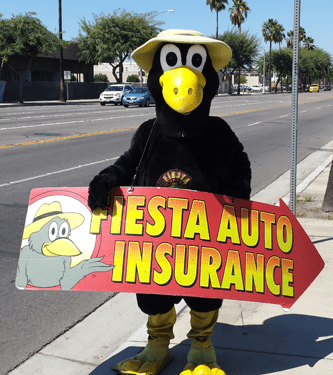There’s a word that’s been floating about the auto insurance industry the past few years: Commoditization. What that basically means is that most of the public now views auto insurance as a commodity, something that is the same no matter where you buy it. This ends up making price the only factor upon which to evaluate auto insurance.
Well, is all auto insurance the same?
The real question here is: “Are all auto insurance policy contracts the same?” The answer is: Mostly. By mostly, I mean that most auto insurance companies offer similar coverages and that the most common coverages are largely the same. Obviously then, some companies offer more coverages than others or additional benefits and there can even be subtle differences in the contracts themselves.
Auto Insurance Coverages that Every Company Carries
The most common auto insurance coverages are pretty much the same. These common coverages include: Liability, Medical Payments, Uninsured Motorist, Comprehensive, Collision, Rental Car and Roadside Assistance (aka: Towing). Yes, small differences in policy language can and do exist and sometimes these small differences can make a big difference come claim time. However, these coverages are certainly more similar between companies than they are different. The most glaring I have come across is with Medical Payments coverage, where different policy language can mean the difference of 40-70% when it comes to total payouts in an injury claim. I detailed these differences in Medical Payments coverage in a previous article. For the most part, though, few differences exist when it comes to the other basic auto insurance coverages. So it’s easy to see why commoditization is taking place. People feel like it doesn’t really matter where they get their auto insurance.
Additional Car Insurance Coverages and Features
In an effort to combat this, many auto insurance companies come up with additional coverages and features. You hear them tout these differences in their commercials, showing how their policy is better. Things like “New Car Replacement“, “Accident Forgiveness“, “Safe Driver Bonus Checks“, “Value Plan“, and many more. All this is to make it sound like their policy is better than the competition’s policy. Here’s a little secret, most all of that is rubbish.
New Car Replacement is one that actually holds some value because it improves your payout come claim time if your vehicle is newer than the specified number of model years (usually 3). But here’s the catch, you pay extra for that feature. It is not something they do out of the goodness of their heart or because their policy is any better. You pay more now (and the next 3 years) and *if* you total your car in an accident, you get a new car, not a used car like what you totaled.
Some of the other claims in the commercials are far worse. “Accident Forgiveness” is a prime example. This is another feature that you pay extra for. Stop and think about that for a moment. They are charging you *now* so that they will “forgive” an accident that you likely won’t have. And it also doesn’t mean that your policy won’t increase or that you won’t be canceled if you have an accident. Again, they make it sound like they are so kind and understanding when in fact it just another way for them to make money by charging for yet another feature on their auto insurance policy.
“Safe Driver Bonus” is similar in that all they are really doing is over-charging you now and then giving some of that money back at the end of the policy term.
My favorite though is the “Value Plan” commercials showing a young woman who eats “ramen noodles every night” because she is young and doesn’t have much money left to spend on her auto insurance. I figured, of course, that this simply represented a bare-bones policy which essentially any company can offer. So I talked to an agent for that particular company about the “Value Plan”. That agent told me “there’s no such thing”. I asked him, “It isn’t even a guideline, a low-limit combination of coverages or something?” “Nope”, he said, “it’s just something they made up because it sounds good on a commercial.”
So how do I choose an auto insurance company?
The operative word in this question is “choose”, make sure you have a choice. If you’re talking to an agentless company like Esurance, GEICO, AAA or some single-company agents like State Farm or Farmers, you’re only going to hear about why that one company is the best for you. Do you really think a State Farm agent is going to tell you that Progressive is your best choice? Do you think that a kid in the GEICO call center is going to explain the many downsides to insuring with GEICO? No. Their mind is already made up, there is only one auto insurance company that’s right for you and that’s their company. So to really get a good picture of the different policies and features and get an unbiased view, you have two choices: Research each company and their policies or talk to an independent agent that represents many different companies. Because it all boils down to choice and without an extensive amount of research or some expert advice, you’re really kind of on your own trying to make a choice based on company propaganda.
 Don’t forget: Price isn’t the only factor.
Don’t forget: Price isn’t the only factor.
As an agent, I am under no illusion that I can change the fact that most consumers’ primary consideration when it comes to auto insurance is price. After all, for most people, all they do is pay, pay, pay for their policy and have few if any claims. However there are other factors that deserve consideration when shopping for auto insurance. Certainly, one could make the argument that these three factors are not only important, but crucial in deciding with whom to trust your auto insurance needs.
Expertise: There’s a fairly good chance that, if you are insured through an agentless company, your insurance ‘expert’ really isn’t. A recent survey indicated that over 15% of insurance call center sales people have been licensed less than 6-months. A full 25% have been licensed less than a year. A whopping 60%+ have been licensed less than 3 years. In California, aside from 12 hours of ethics training, only 20 hours of in class training is required to become licensed. Think about THAT! It is entirely possible that your insurance “expert” couldn’t spell the word “insurance” a month ago. Think about that when deciding who should be standing between you and financial disaster if you don’t get the proper advice.
Service: Let’s not underestimate the value of good service. When you call your auto insurance company, do you have to muddle through their phone system or are you immediately speaking with a live person that can help you? In a recent phone call to a company I won’t nAAAme (no, really, I don’t want to nAAAme them, because if I nAAAme them, they might get AAAngry and threaten me with a lAAAwsuit…), the information needed could not be obtained without first spending a minute or two entering information on the touch tone keypad then enduring a 12-minute hold. At the end of it all, my simple question finally got answered… Incorrectly. Somewhere along the line, companies decided that their time was more valuable than yours. If making you wait 15 minutes to get an answer would save them a little money, well that was the way to go. Most agencies, both independent and single company agents, will answer the phone with a live human from the get-go.
Choice: Again, we’re back to choice. Finding an agent where you have a choice has many advantages. Whether you have special needs because you own a business or have added custom equipment to your car or have young drivers that only drive part time, no one company is always right for every driver and every car. Or maybe your auto insurance needs are pretty run of the mill but you want an agent that knows which companies have the best rates in your area. Agents with a choice of companies obviously have a better chance of finding the policy that’s right for you and your situation.
Yeah, yeah, yeah… But what about the price?
Oh yeah… Price: Independent agents usually strive to represent companies with good rates, it just makes sense for their business. One company agents and call center companies still only have one choice. You are more likely to find a lower price with an independent agent, without the hassle of having to get dozens of quotes yourself.
Bottom Line: All auto insurance is NOT the same
Everywhere you go, everywhere you look it seems like there is a car insurance ad and by now they all sound the same. It is impossible to accurately gauge the companies and products at face value. Your experience will vary greatly, your coverage will vary greatly and, of course, the price can vary greatly. Of course putting some thought and research into the process would serve you well and not just view insurance as a one-dimensional commodity focused on price.
